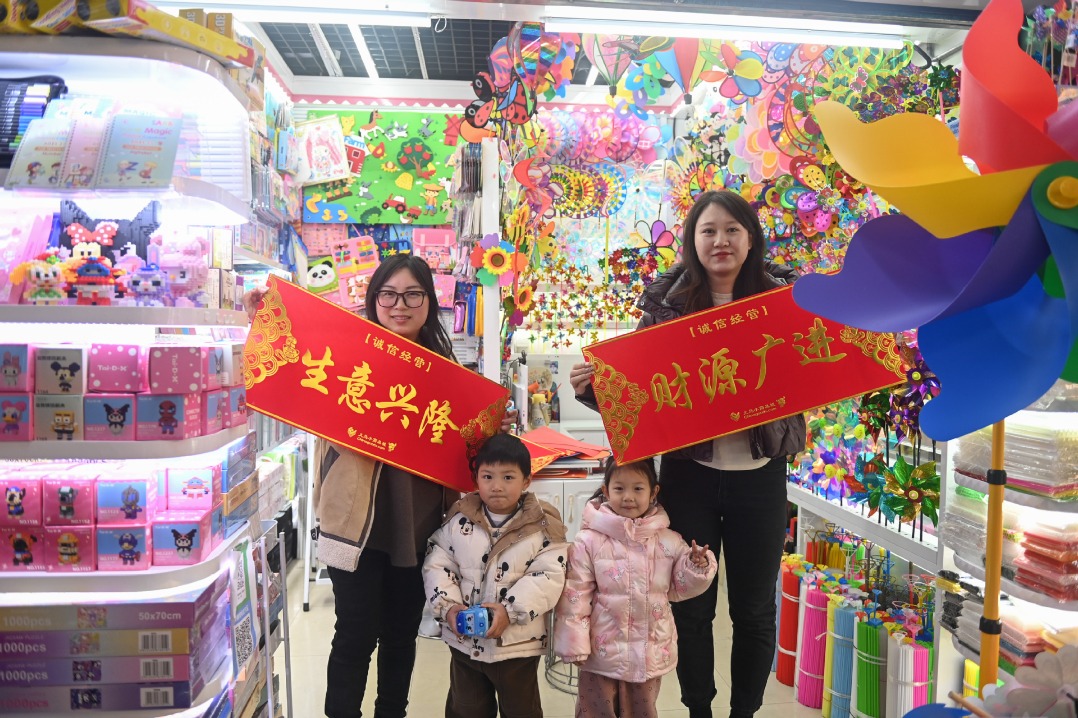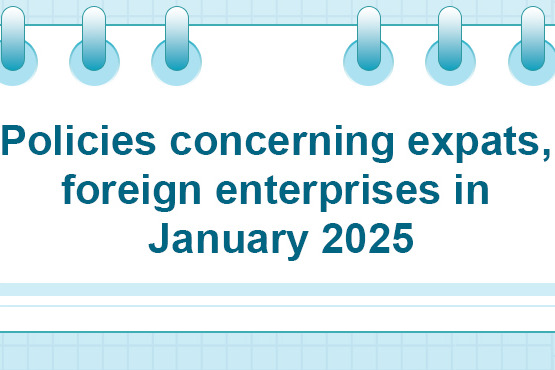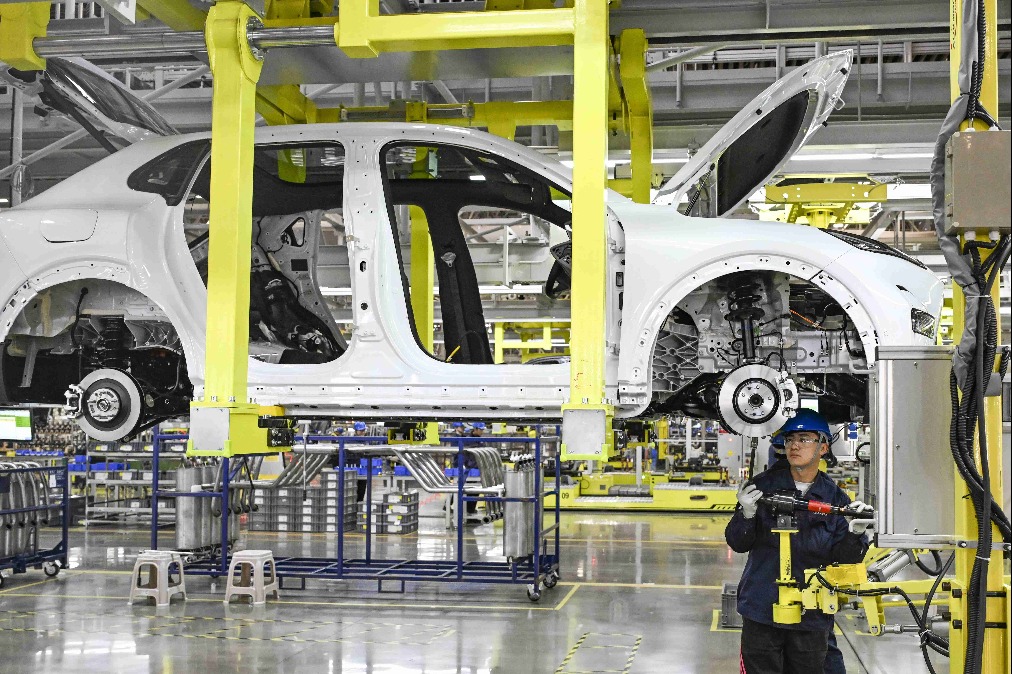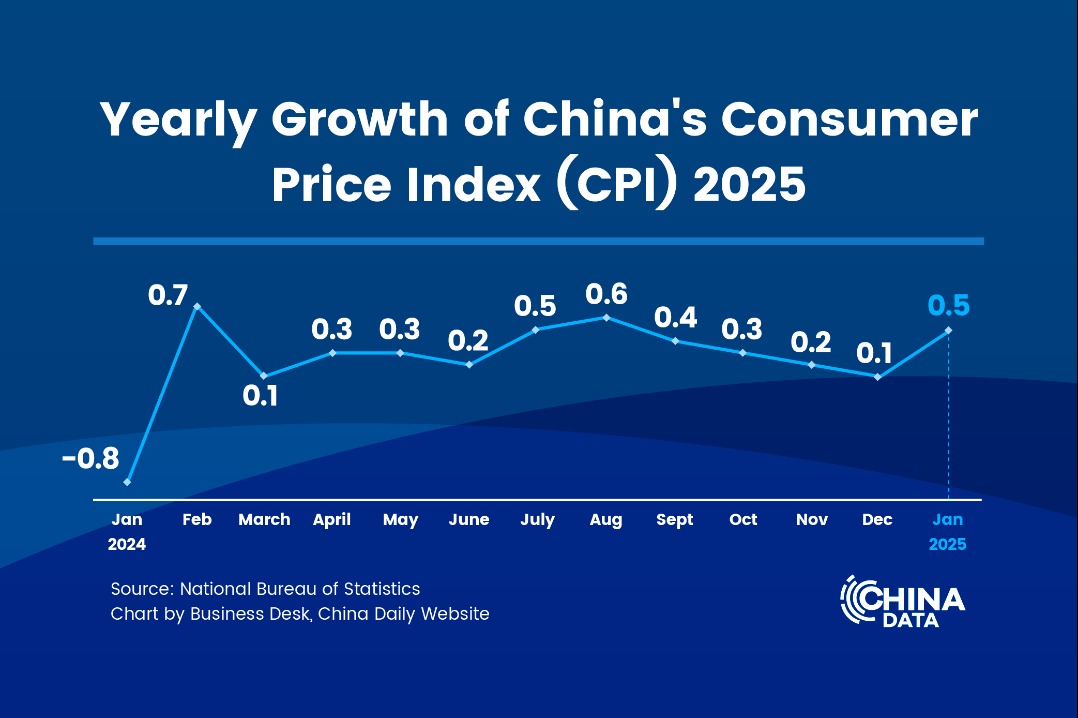Healthcare MNCs bullish on Chinese modernization

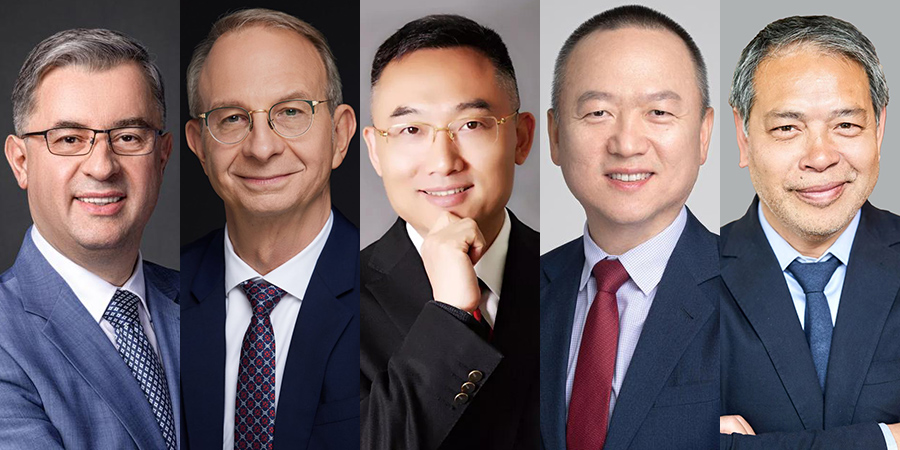
Editor's note: With strong policy support, unremitting technological innovation and industrial upgrading, China's economic recovery continued to gather steam in the third quarter, with its GDP expanding by 4.9 percent from a year earlier, leading to a 5.2-percent year-on-year growth in the first three quarters. China Daily presents a series of Q&As with top multinational corporation executives, discussing their perspectives on the Chinese economy and how they will position future business in China.
Q1 Given the complex current global economic and geopolitical situations, how do you position the Chinese market in your overall global business radar? What's your outlook for China's economy and your company's operations in the country for this year and next?
DOBROCKY: Despite current uncertainties, our outlook for the Chinese market in the long run remains unchanged. Boehringer Ingelheim sees China as a focus market and a source of innovation. We have a firm belief in the potential and resilience of the Chinese market and appreciate the continuous improvement of the business environment. Going forward, we hope to see a robust Chinese economy in the context of further opening-up policies that will facilitate more cross-border business interaction and increase local demand.
With our China Key strategy, which enables our active participation in the early phase of global studies, we expect similar regulatory approvals in China. In animal health, more than 15 new products and new indications will be approved in China in the next five years, covering key species of livestock and companion animals. With such an innovative pipeline, we hope to contribute to China's healthcare industry and benefit many patients and customers.
GABOR: Over the last decade, Merck has invested nearly 6 billion yuan ($820 million) in China. Today, China is our second-largest market with approximately 3 billion euros ($3.2 billion) in sales last year. The global economic and geopolitical situation is evolving with great complexity. To us, there is no alternative to free trade and no global world without China.
In 2023, China set its GDP growth target at around 5 percent, once again injecting impetus into global economic recovery. I believe in the marvelous "China speed" and its growth momentum, which is driven by unremitting efforts to embrace high-quality development through a Chinese path to modernization.
This June, Merck invested about 70 million euros to expand the Nantong life sciences center to increase its high-purity reagent production capacity, which is expected to be operational by 2026. As for our electronics sector, we have announced a growth plan to further invest at least 1 billion yuan in China by 2025 to enhance our localized manufacturing, technology and supply chain capabilities.
DONG: China is one of Menarini Group's top growth markets. The top management and board of directors of the group are strongly convinced that China is and will continue to be one of the most strategic growth drivers for Menarini at the global level. Menarini is investing in China and is committed to continuing this effort and development for the Chinese market in the long term.
We have witnessed the strong resilience and tremendous potential of China's economy since the beginning of this year. The long-term positive fundamentals remain unchanged, as does Menarini's commitment to China. We will deepen our presence in the Chinese market through ongoing innovation, in-depth partnerships, localization strategies, digital transformation and active involvement in China's public health administration to achieve our longer-term development goals.
From new pipelines to digital transformation, we are striving to accelerate the introduction of innovative drugs to China. On the other hand, we are continuously exploring new technologies and models in the field of healthcare to meet the growing needs of Chinese patients and to help the country achieve its high-quality development goals.
SHAN: We believe that China will continue building on its commitment to bringing the best medicine to its citizens and as such, China is a strategically important market for Takeda. We are confident that the fundamentals of the healthcare industry remain strong and are delighted to see the government accelerate the path to China's high-quality economic development.
Last year, Takeda announced a strategic development plan which aims to unleash our full potential in the China market. We delivered strong results last year and will further engage in the integration and co-creation within China's health industry ecosystem. In addition, the digital transformation of the Chinese healthcare industry is accelerating — which will continue shaping the future of our industry with opportunities for new solutions for patients and service providers. We've been investing in data and digital technology as a core capability to ensure we stay competitive in the future. By working with Chinese companies that have demonstrated world-class leadership in digitalization, we hope to provide patients and healthcare providers with digital tools that give them more control over their lives and work.
MOREAU: As the second-largest healthcare market globally with about one-fifth of the world's population, China undoubtedly deserves the world's attention. However, it's not just the size of the market amplified by the number of people, but also the new impetus of innovation and commitment to high-quality development and high-standard opening-up that make China appealing to all innovation-driven companies.
After being active in the Chinese market for 27 years, UCB has been opening a new direction of "China for China and China for the world". In this exciting and rapidly evolving market, we are constantly reinterpreting it and updating our corporate strategy to seize the moment.
I have always believed that the Chinese market will be successful, and the global market will be more successful as a result. If you are not actually standing on the land, you can only understand China as a big market with a big population. Only when you are actually here, can you get a deep sense of the dynamism of the market.
No global company can ignore the Chinese market because the next cutting-edge technology is likely to come from China.
Q2 China's economic policymakers have assured greater efforts to attract foreign capital, widen market access and ensure a level playing field for both domestic and foreign companies. In this context, what new policy measures do you expect from Chinese authorities in the near future?
DOBROCKY: We are encouraged to see a stream of government policies that aim to improve the business environment in different dimensions — including the newly released 24 measures to attract foreign investment — which cover areas such as fair competition, tax incentives, and research and development support. We hope these measures can fully leverage China's market advantages and are implemented in a timely, coordinated and consistent manner to further boost confidence.
In particular, we are expecting continuous reform to ensure a level playing field for all market actors and policies improving the ease of doing business. We hope our investment in innovation can be rewarded through reasonable mechanisms of pricing and intellectual property rights protection. If business innovation is not properly rewarded, enterprises will lose the incentive to innovate. These will allow multinational companies' innovation outcomes to benefit patients in both China and around the world.
GABOR: Despite uncertainties and challenges in the post-pandemic era, China embraces foreign direct investment and is continuously rolling out measures and policies that facilitate multinational companies to deepen their footprint in the country. In my opinion, that practical approach is the precious certainty in an uncertain world.
We continue to pay attention to the process of incorporating targeted tumor drugs into the national essential medicines list — including gene testing for targeted tumor therapy added to national medical insurance, further optimization of China's medical policies on assisted reproduction, institutionalized thyroid screening for women of childbearing age and digital whole-course diabetes management. We also anticipate further Customs approval facilitations for importing key materials for biosafety testing and pharmaceutical research.
Our long-term concerns and advocacy also lie in the further expansion of investment subsidies and incentives for MNCs, equal market access and competition for domestic and foreign enterprises in the process of government procurement activities and the participation of foreign corporations in formulating relevant industry standards.
To some extent, the guidelines issued on Aug 13 by the State Council have addressed Merck's development needs and long-term concerns, but we anticipate concrete measures for policy implementation to be applied across China as soon as possible.
DONG: In recent years, China has adopted a series of policy reforms and institutional innovations in the field of healthcare, resulting in a thriving industry, a more dynamic market and a fair arena for all players regardless of whether they are local companies or MNCs. This also provides good opportunities for Menarini, so that we can launch new and innovative medicines in China more quickly, meet the needs of Chinese patients as early as possible and include these medicines in more medical and healthcare insurance programs.
We hope China will further open up its market access to essential medical products and further improve its health insurance payment mechanism for smart and digital healthcare. We are willing to participate in this process and work with the government and stakeholders to increase access for patients to innovative solutions to invigorate lives in China.
SHAN: In recent years, China has introduced a series of measures to continuously optimize the business environment, providing institutional safeguards for multinational corporations investing in China.
Most recently, the State Council released a document outlining opinions on further optimizing the foreign investment environment and increasing foreign investment, which includes several provisions relevant to the healthcare sector, such as encouraging foreign-invested enterprises to conduct clinical trials of cell and gene therapy drugs that have already been listed overseas within China. Another example is the release of another document outlining opinions on strengthening intellectual property rights in the field of centralized pharmaceutical procurement.
These are all very encouraging for healthcare companies like Takeda. We look forward to their implementation to accelerate the process of bringing more innovative therapies to the Chinese market.
MOREAU: I chose to come to China on my own initiative and I particularly insisted on coming at this time. In my business sense, I think it's the best time — it's a time of opportunity. It's not just the vastness of the place, but also the energy of innovation.
We appreciate the actions the Chinese government has been taking to further encourage and support meaningful innovations to come in a safe and sound environment and in line with international standards.
We are not only focusing on cooperation opportunities with innovative pharmaceutical companies, but also exploring opportunities for industry-academia-research cooperation to find the next frontier.
Q3 As China continues to pursue high-quality development through a homegrown path to modernization, what is the vision for your company's business in the country over the long run? What business opportunities do you foresee emerging as part of the process of Chinese modernization?
DOBROCKY: China positions innovation at the heart of its modernization drive and is striving to build cutting-edge technologies, spur economic growth, meet the country's critical needs and improve people's health by implementing an innovation-driven growth strategy. The strategic focus on innovation also helps global healthcare companies capitalize on the huge potential of China's market. People's urgent need for innovative products, health services and demand for animal health solutions underpin the biggest opportunities for Boehringer Ingelheim in China.
Looking into the future, leading in digitalization remains a higher priority than ever. Boehringer Ingelheim has elevated digital transformation to a strategic level to tap its potential. We will continue to deploy the latest advances in digitalization in development, clinical trials and commercialization, to help create differentiated value for patients and customers and contribute to the shaping of a robust digital innovation ecosystem.
We will continue to cultivate the Chinese market and work with partners to promote open innovation and contribute to the high-quality development of China's healthcare industry.
GABOR: Merck's three business sectors — life science, healthcare and electronics — align with China's industry priorities in realizing steady and sustainable high-quality development. On its unique path to modernization, China has increasing needs in the areas of healthcare, high-quality food and drugs, environmental protection solutions and the digital economy, where Merck is in a sweet spot to continuously contribute with our innovative products and services.
We have accelerated our innovation strategy accordingly and are rapidly bringing global pipeline assets to China. We also see the great potential of integrating into the vibrant local innovation ecosystem to better serve patients and tap into the next wave of growth. Our life science products and services are helping Chinese pharmaceutical companies develop innovative medicines and life-saving vaccines.
Digitalization is another important pillar of Chinese-style modernization where we foresee opportunities for revenue growth. Furthermore, we are also in a strong position to offer various green solutions to the market.
DONG: The Chinese government has given strategic priority to people's health and positioned healthcare as fundamental to China's modernization and its "sense of fulfillment, happiness and security for Chinese people". As their average living standards and average life expectancy increase, the Chinese people have higher expectations for quality of life. On the other hand, they could face more health challenges as there are still a lot of unmet medical needs.
As a result, China is not only one of the fastest-growing markets for Menarini, but will remain one of our most important strategic growth engines globally. To this end, Menarini will stay flexible. We will continue to invest in innovation and improve the quality and clinical value of our offerings to meet more medical needs. At the same time, Menarini will actively participate in the construction of China's healthcare ecosystem, drive digital healthcare and health management, and provide more comprehensive and intelligent medical solutions for Chinese patients. Besides, we want to achieve win-win results with local companies, advance the innovation and growth of the pharmaceutical industry, improve China's medical capabilities and ultimately benefit the country's people.
SHAN: The healthcare industry is undergoing innovation-led transformation and accelerating its convergence with international standards. We are pleased to see that the central government's strong commitment to improving the quality of life and health equity for its people will lead the path to the country's modernization. Innovation is rewarding and will lead to the high-quality development of the healthcare industry in China, which is fully in line with Takeda's aspirational plan to make China the second-largest market globally by 2030. More importantly, we believe China has the potential to be the source of global innovation in the biopharmaceutical industry. Along the way, Chinese talent will showcase their full capabilities and lifelong learning to become the engine of global talent.
MOREAU: In the long term, we want to ride the wave of China's fast and booming innovation development. China's current innovation capability is not just "fast-following and then making it faster and pricing it lower", but it is the right time and the right people to produce meaningful innovations. The next frontier of cutting-edge technology is likely to come from China. UCB is flexible, agile and quick to adapt due to our focused approach and medium size, which allows us to better grasp opportunities. The future has not yet fully unfolded and no one can predict it. But this is where the opportunities lie.
















